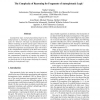830 search results - page 11 / 166 » Topological Reasoning and The Logic of Knowledge |
AMAI
2004
Springer
14 years 27 days ago
2004
Springer
The framework of algorithmic knowledge assumes that agents use algorithms to compute the facts they explicitly know. In many cases of interest, a logical theory, rather than a par...
CORR
2010
Springer
13 years 7 months ago
2010
Springer
Autoepistemic logic extends propositional logic by the modal operator L. A formula that is preceded by an L is said to be "believed". The logic was introduced by Moore ...
AIML
2006
13 years 9 months ago
2006
We propose a framework for comparing the expressive power and computational behaviour of modal logics designed for reasoning about qualitative aspects of metric spaces. Within this...
CIKM
2007
Springer
14 years 1 months ago
2007
Springer
Topological information plays a fundamental role in the human perception of spatial configurations and is thereby one of the most prominent geographical features in natural langu...
AI
1999
Springer
13 years 7 months ago
1999
Springer
Reasoning about the physical world is a central human cognitive activity. One aspect of such reasoning is the inference of function from the structure of the artifacts one encount...

